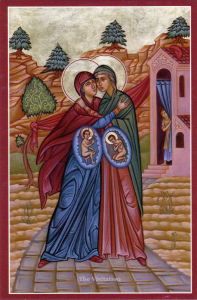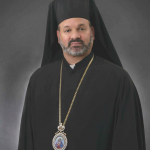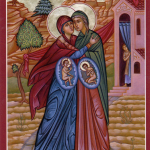Deprecated: trim(): Passing null to parameter #1 ($string) of type string is deprecated in
/home/aoiusa/public_html/wp-content/plugins/sexybookmarks/public.php on line
388
Deprecated: trim(): Passing null to parameter #1 ($string) of type string is deprecated in
/home/aoiusa/public_html/wp-content/plugins/sexybookmarks/public.php on line
394
Deprecated: trim(): Passing null to parameter #1 ($string) of type string is deprecated in
/home/aoiusa/public_html/wp-content/plugins/sexybookmarks/public.php on line
400
Source: Frederica | Frederica Mathewes-Green
– A talk for an Orthodox Christian Pro-Life Event; January 22, 2012.

The Visitation of Mary and Elizabeth
Today is the 39
th anniversary of Roe v. Wade, the Supreme Court decision that legalized abortion—through all 50 states, for any reason whatsoever. When I was a college student, back in the 70’s, I was in favor of legalizing abortion. I wasn’t a Christian then, but I was a feminist, the first feminist in my dorm, and I was loudly in favor of social revolution and women’s rights. I took it for granted that abortion was necessary, if women were ever going to be equal to men.
Of course, I didn’t think the number of abortions would ever be very high. Most of us, at that time, assumed that women wouldn’t want to have abortions, and would do so only in the most extreme situations. Things didn’t turn out that way. As of last June, the number of abortions since Roe v. Wade was 53,600,000. (NRLC estimate of 49,551,703 through 2007, and 1 million /yr since then)
A number like that is hard to grasp. There’s a quote often attributed to Josef Stalin: “A single death is a tragedy. A million deaths is a statistic.” So people have tried to think of illustrations to make the numbers real. Many years ago, I heard a speaker say that, if the name of each child killed by abortion was inscribed on a monument like the Vietnam War memorial, the wall would stretch for 50 miles. That was a long time ago, and the wall by now would be several times longer; but of course no such wall could be built, because those children had no names.
Sometimes pro-lifers have tried to represent the statistics by setting up a temporary “cemetery of the innocents,” with one white wooden cross representing each child. A friend of mine worked in the Dept of Health and Human Services under George Bush Sr, and one day she and the director watched out the window as people set up one of these cemeteries; 4100 white wooden crosses stood in lines across the lawn. The director asked what was going on, and she replied that it was designed to make people realize the numbers of abortion; each cross represented an aborted child.
He looked at the multitude of crosses and said, “Imagine, that many in a single year.” She replied, “No, sir. That many in a single day.”
Why should we care about this? Why should Orthodox Christians, in particular, care? Isn’t the pro-life cause something that Catholics get involved in, and evangelical Protestants? What business is it of ours?
You may be surprised to learn that abortion was common in the ancient Roman Empire. The methods were more dangerous than today (I should say, more dangerous to the mother; every abortion is lethally dangerous to the child). But those methods were nevertheless used by women who wanted to conceal sexual activity, or who were forced to have abortions by their husbands and lovers.
The ancient, pagan world was a harsh one. Not only were children aborted before birth, but a newborn child was not officially received into a family until its father picked it up and held it. If the father didn’t want the child he simply refused to take it up, and the child was legally abandoned. This was called “exposing” an infant; it would be placed in some public place, and the social fiction was that someone else might pick it up and care for it. Sometimes people did take in these babies, and rear them to be sold as slaves or put on the street as prostitutes. But, often enough, no one took the child before it was found by dogs or other animals, or died of exposure and starvation.
And this was legal. It was a harsh world. Christians stood out as different, in that world. They were different in seeing every human being as worthy of dignity, whether free or slave, male or female, Jew or Gentile (as St. Paul said in Galatians 3:21). One of the big differences between Christians and pagans was that Christians did not have abortions. From the earliest years, the Church Fathers spoke against abortion. Let me read you some of their statements.
This is from the Didache, a work which was written about the same time as the Gospels: “You shall not murder a child by abortion.”
The Letter of Barnabas, written about the same time, repeats those words. “You shall love your neighbor more than your own life. You shall not murder a child by abortion.” Note the connection he makes there. This is not about sexual morality, it’s about loving your neighbor, who in this case is a helpless child.
The Letter to Diognetus, probably written around 125, describes to a nonbeliever what Christians are like. He writes, “They marry, as do all others; they beget children, but they do not abort fetuses.”
The Apocalypse of Peter says that, in heaven, aborted children are cared for by an angel named Temlakos. He writes, “The children shall be given over to the caretaking angel Temlakos, and those who slew the children will be punished forever, for this is God’s will.”
Let’s pause a moment and ask: who slew them? When a woman aborts her child, who is to blame? Most people would say that it is the woman’s choice, so she bears the responsibility. But I learned how complex it can be some years ago, when I was working on a book titled Real Choices. My goal in the book was to find out why women have abortions, and figure out what pro-lifers can do to help them have better alternatives.
In the process I went all over the country interviewing women who had had abortions, and I asked them to tell me what led up to their choice. What I found was that, in many tragic cases, the abortion hadn’t been her choice at all. Sometimes it was the choice of her boyfriend or husband, and sometimes it was her own parents pressuring her to have an abortion. Two women told me the same story, that even while they were lying on the table in the abortion clinic, they were praying the boyfriend would burst through the door and say, “Stop! I changed my mind!”
So it’s not up to us to decide who gets the blame. God alone reads the heart. Surely, we as an entire culture must shoulder some of the responsibility, for giving women the message that abortion can solve her problems, and she should be grateful to have a so-called “choice.” Yet it’s obvious that this “choice” is profoundly unnatural in biological terms; throughout history women would regard the premature end of pregnancy and death of an unborn child as a tragedy. But we’ve been through almost 40 years of brainwashing about how liberating abortion is, so we shouldn’t be too surprised that so many women end up in abortion clinics—and when it’s all over, are left to grieve alone. There is an enormous thundercloud of unspoken grief in America, due to the millions of women who bought the abortion lie, and now are haunted by that so-called choice.
So there’s no room for blame. God sees the heart, and God knows. And whatever the woman’s role in this tragedy might be, surely there’s nothing as cold-hearted as the person who decided to go into business doing abortions all day long.
Yet, even though the early Christians refused to participate in abortion, a terrible rumor circulated about them in those days. You know that, in the centuries when Christianity was illegal, some parts of our faith were kept secret and not shared outside the community of believers. For example, the Holy Mystery of the Eucharist was something only baptized Christians knew about, and it was never spoken about to nonbelievers. We still say, in the pre-communion prayer of St. John Chrysostom, “I will not speak of your mystery to your enemies.”
Yet rumors started to circulate that Christians were cannibals. There was a story going around that in Christian worship a baby was put inside a sack of flour and beaten to death, and then eaten. Well, if you thought people in your neighborhood were doing that as part of a religious ritual, you’d want to see them executed too. And you can see how the rumor is a mixed-up version of our belief that Christ came to earth as a child, and that he gives us his Body and Blood in the Eucharist. So, many of the early Christians were martyred because they were thought to be child-killers and cannibals, and some early writers protest it’s a lie, Christians do no such thing, while it’s pagans who commit abortion and expose newborns.
Minucius Felix wrote, around 200 AD, “I would like to meet the person who says …that we [Christians] are brought into the faith by means of the slaughter and blood of an infant. Do you think that it can be possible for such a tender little body to receive such fatal wounds? Is it possible for anyone to pour forth the new blood of a little child, scarcely come into existence? Nobody is capable of believing this—except the person who would do it. Yes, I see that you expose your newborn children to wild beasts and to birds, and at other times crush them to death. There are some women who drink medicines that extinguish the life of a child while it is still inside their body, and thus murder their own relative before they bring it forth.”
Tertulllian says that for Christians, “Since murder has been once and for all forbidden, we may not destroy even the fetus in the womb. …To interfere with a birth is merely an earlier way of killing a person. It doesn’t matter whether you take away a life that has been born, or destroy one that is coming to birth.” (Apology 9:8) Elsewhere he wrote, “We hold that life begins with conception, and that the soul also begins at conception; life has its commencement at the same moment and place that the soul does.” (Apology 27)
St. John Chrysostom wrote, “Do you condemn the gifts of God, and fight against His laws? Childlessness is seen as a curse, but you seek it as though it were a blessing. Do you make the chamber of birth a place of slaughter? Do you teach the woman who is formed to give life to perpetuate killing instead?” (Homilies on Romans 24)
St. Basil puts medicines that cause abortion in the same category as other kinds of killing. He writes, “The man or woman is a murderer who gives a potion, if the person that takes it dies from it. So also are they who uses a medicine to procure abortion; and so are those robbers who kill on the highway.”
Our Orthodox Christian heritage is absolutely opposed to abortion and child-killing from its very beginnings. This stand against abortion and exposure of infants is, in fact, one of the things that attracted people to the Christian faith. Women were drawn to a religion that, for a change, would stop men from taking their children away.
Our faith’s affirmation of life from the moment of conception is evident in the passage in the Gospel of Luke, in which Mary goes to visit Elizabeth, and Elizabeth says that her unborn son leaped for joy at the sound of Mary’s voice. She says, “Why do I deserve such honor, that the mother of my Lord would come to me? For when the sound of your greeting reached my ears, the babe in my womb leaped for joy.” (Luke 1:39-45) The unborn John the Forerunner recognized the presence of Christ and his mother, and Elizabeth, with prophetic insight, realized what was happening.
Our Lord Jesus Christ did not become a human being on Christmas Day, but 9 months earlier, on March 25, the Feast of the Annunciation, when the angel appeared to the Virgin Mary and told her that she would conceive a child. The Forerunner did not become a human being on the day he was born; he was already a prophet and a servant of the Most High, even in his mother’s womb.
I don’t see how people living in a scientific age can think a fetus in the womb is not a living human being. People have understood this for centuries—every Christian who went to church on the feast of the Annunciation, for example. Now, we know much more than they did, in terms of prenatal science. We have sonograms and can actually look inside the womb. We know that, at the moment the sperm dissolves in the ovum, there is a living, growing human being. There is actually no scientific debate about when life begins. From the moment of conception it is alive. From that moment is starts growing, fast. By 21 days, it has a heartbeat. It is definitely alive, and in fact if it was not alive she would not need an abortion, but would have a natural miscarriage. So “When life begins” is not something scientists, or even ordinary people, are confused about.
It is human, too. If you looked at a cell from the growing unborn child under a microscope, you would say, “Yes, that’s human. That’s not chimpanzee, it’s not watermelon. It is human.” This living being is 100% human.
What’s more, it is a unique living human. If you took a cell from the mother, a cell from the father, and a cell from the unborn child, and analyzed the DNA, you would say, “There are three individuals here.” The unborn child is dependent on its mother for sustenance, and after birth will continue to be dependent on both father and the mother for shelter and food. But it is not a part of the mother. It does not have her DNA.
So we know that from the very beginning this unborn being is alive. It is human. It is unique. And that is the basis of the Orthodox Christian belief that abortion is wrong.
Of course, there are many women who’ve had abortions, but didn’t want to. Or may have felt it was the only choice at the time, and in the years afterward regretted it. There is a lot of hidden grief about abortion, but very little talk about it.
When I was writing Real Choices, one woman told me that, at the time of her abortion, she was pro-choice. But afterward she felt terribly sad, and she told me, “I couldn’t tell anybody how I felt. If I’d told my pro-choice friends that I felt depressed, they would say, ‘Are you a traitor? You had your choice; you should be happy with it.’ But if I told my pro-life friends, I was afraid they might say, ‘You’re a murderer. We won’t have anything to do with you.”’
So there are many, many women, and certainly some Orthodox Christian women, who have this in their past, and they grieve but don’t feel free to talk about it. I would urge anyone in that position to talk with your priest. Believe me, there’s nothing you can say to a priest that he hasn’t heard sometime before. He’s never going to be shocked. And priests often say that, when they hear a confession, it makes them admire the person more, who love God so much that they’re willing to speak of painful things. So please don’t keep this in. If you hide this grief inside it feels even bigger and more overwhelming than needs to be. So schedule a talk or schedule a confession, and begin to be healed from this guilt. God forgives.
If you’ve been involved in an abortion, don’t let yourself be overtaken by despair, but remind yourself that that child is still alive, in heaven. Maybe it did not have a long earthly life, but its eternal life will go on forever, in the presence of God. Psalm 27:10 says,
Though my mother and my father reject me, you will take me up.
God the Father has taken that child up, as one of his own. And if you persevere on the path of holiness, one day you’ll be reunited with that child, in the place where all sorrow and sighing has fled away, and the tears have been wiped from every eye.
If you need to talk through you grief, look in look in the yellow pages for “abortion alternatives.” You will find listed there a number of pregnancy care centers, and these center’s don’t help only pregnant women, but also women who have had abortions, and even the fathers of aborted babies. Nearly all pregnancy centers offer abortion grief counseling, and they can help you work through this grief to resolution.
In conclusion, I’d like to give you three reasons for hope. Though abortion has been a fixture in America for 38 years, there is reason for hope.
The first is that people can change their minds about this issue. I can give myself as an example. As I said, I was very pro-abortion back in my college days. One day I was home on vacation, and was reading my dad’s copy of Esquire magazine. In it there was an article titled “What I Saw at the Abortion.”
As I read the description of a second-trimester abortion, I was horrified. Because I was anti-war, anti-death penalty, a vegetarian, anti-violence in every form. And I had to admit that abortion was the violent taking of a human life. It was completely incompatible with my other non-violent values.
So the first point of encouragement is—me. It is possible for people to change, even if they’ve been hardened defenders of abortion. If I can change, anyone can change.
The second reason for hope is that polls are just beginning to show a shift in America on this issue. It made the news in May 2009, when the Gallup organization released the surprising results of a poll. For the past 14 years, Gallup has been asking Americans, “With respect to the abortion issue, do you consider yourself to be pro-choice or prolife?”
In 2006, 51% said they were pro-choice and 41% pro-life. But in May 2009, those numbers exactly flipped. For the first time, a majority said they were pro-life; 51% pro-life and 42% pro-choice.
Now, it’s not like there were a lot of pro-life messages in the culture during those three years. If anything, it looked like the abortion debate was over. People weren’t talking about it as much as they used to. Yet maybe, in that moment of silence, some deep-seated ambivalence had a chance to come forward. For whatever reason, America was becoming a country where the majority of the people are now willing to claim the label “pro-life.”
One possible reason this has happened is that young people are more pro-life than older people, and as they come into adulthood the balance is beginning to shift. I think that, for my generation, abortion was framed as being all about the woman, and what struggles she faced, and her right to choose. But I think that for younger people it’s about the baby. Boomers identified with the woman, but they identify with the child who is at risk.
In October, 2010, a book was released titled “American Grace,” and it contained the results of the most comprehensive survey ever held in America on the topic of religion. One thing the authors found was that young people are more pro-life than their parents. Now, young people are not more conservative than their parents, and they’re not religious. They are less likely to attend church, more likely to favor of gay marriage and to call themselves liberals. But they are consistently more opposed to abortion than their parents.
The authors, Robert Putnam and David Campbell, say that this is showing up consistently in many polls, so there’s no longer any doubt about it. They don’t know why it is happening, but they suggest that maybe the prevalence of ultrasound images of unborn babies has made a difference. Also, that young people don’t think it’s likely abortion will be made illegal, so opposing it doesn’t seem likely to cause a drastic change in the law. And they think that young people feel that contraception is available to everyone, so if there’s a pregnancy, it’s due to irresponsibility. They don’t have sympathy with that.
I don’t know if you’ve seen the movie Juno (2007), about a high school student who gets pregnant and places the baby for adoption rather than have an abortion. The authors of American Grace call it “a good illustration of young people’s increasing uneasiness with abortion.”
When Juno gets pregnant she calls up an abortion clinic and makes an appointment, in almost a flippant way. But as she’s walking in to keep her appointment she meets a classmate who is outside protesting. The classmate tells her that her baby already has fingernails, and Juno is surprised. As she sits in the clinic waiting room, she keeps noticing people’s fingernails, clearly thinking about it—and she gets up and walks out without the abortion. The authors of American Grace say “We mention the movie because the character of Juno neatly embodies young people’s unease with abortion. …At no point in the film does she offer a religious reason for choosing not to abort her pregnancy.”
And here’s a third reason for hope: we don’t have to wait for the laws to change on abortion to start reducing these high numbers. We can make a difference today by helping pregnant women choose life.
When I wrote Real Choices, I was trying to find out what were the main reasons pregnant women chose abortion rather than finishing the pregnancy and either raising the child or placing it for adoption. What do pregnant women need?
I thought the answer would be something like, more maternity homes, more college scholarships. But when I asked women who had had abortions what the reason was, I kept hearing the same thing. Over and over again, women told me, “I had my abortion was because of a relationship.” Most of the time it was the father of the child who was pressuring her to have an abortion; in other cases, it was her parents. In 88% of the cases, the woman had had the abortion because someone she loved told her she should.
When I asked, “What could anyone have done to help you have the baby,” Over and over women told me, “I would have had the baby if there had been somebody to stand by me.” They weren’t asking for a lot; they weren’t asking for housing and jobs and a handout. They were just asking for a friend.
All over this city there are pregnancy care resource centers that exist to give pregnant women that support. They give a lot more than that, but the most important thing is standing by the pregnant woman and helping her be strong. Again, look in the yellow pages under “alternatives to abortion.” These organizations always need help from people who believe in their mission. They need donations of diapers, baby formula, maternity clothes, and they need volunteers, too. Think about giving your time to one of them. That’s the third reason for hope: you can prevent abortion, one case at a time, right in your own neighborhood, just by being a friend.
Finally, I want to recognize you for your courage and dedication. After I’d been speaking and writing about the abortion issue for many years, appearing on TV shows and college campuses all over the country, I came to the conclusion that the biggest influence in the abortion debate is peer pressure. I saw over and over that my opponents in debate had no answer for the arguments I put forth. So they would just ignore them, and talk about how awful pro-lifers are. I would attack abortion, and they would attack me. They didn’t try to defend abortion.
If you stand up on this issue, you will be attacked. Pro-choice is still the socially-approved position, and it takes a lot of courage to publicly say that you stand for life. In every generation there’s an issue like this, that draws a line between those who will stand up for what is right, and those who just go along. Only the bravest people take a stand, and continue to bear witness even when others mock them and misrepresent them; only the bravest keep standing when, from a worldly perspective, the cause looks lost. Only the most dedicated people are willing to keep working for change, when the struggle is all uphill and they reap nothing but rejection.
You are those people. And you are not alone. The angels and saints see you persevering in this labor, just as champions of earlier generations did their part. The struggle is not lost. Despite overwhelming pressure to favor abortion, the tide of public opinion is beginning to turn. Young people are leading the way.
Your efforts on behalf of this cause, to help pregnant women and preserve the lives of unborn children, are seen by God and the angels, and will stand for eternity. You are the heroes of this hour—and, even if the hour looks dark, it truly is darkest before the dawn. Truth cannot be suppressed forever. You may wonder if the pro-choice side has won the day—but sooner or later, that day will end. No generation can rule from the grave. The time to get on the right side of history is now.

 Source: LifeSite News
Source: LifeSite News





